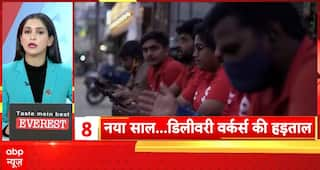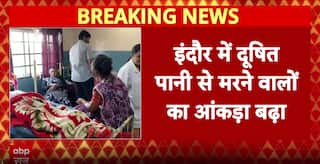Amid 'Very Poor' AQI, Delhi's RML Hospital Launches Clinic For Pollution-Related Illness: Check Timings
With the start of the Diwali week on Monday, Delhi's air quality remained in the ‘very poor’ category, owing to a drop in wind speed, which has hindered the dispersion of pollutants across the city.

Ram Manohar Lohia Hospital Delhi: With the advent of the festive season, Delhi's air quality has deteriorated. To address this, the Ram Manohar Lohia (RML) hospital in the national capital has launched a dedicated clinic for pollution-related health issues, where patients can consult doctors under one roof for illnesses ranging from respiratory problems to skin diseases. The clinic situated in outpatient department (OPD) rooms 1 to 5 on the ground floor of the hospital is operated weekly from 2 pm to 4 pm on Mondays. Patients visiting the clinic are not only given treatment but are also provided with guidance on self-care during pollution season.
According to RML's Medical Superintendent Dr Ajay Shukla, the clinic has been set up at the hospital to cater to those facing issues due to pollution. “There is a continuous increase in pollution-related illnesses among patients and to caterers all such patients, we have launched this initiative,” says Dr Shukla.
Delhi's Worsening AQI
With the start of the Diwali week on Monday, Delhi's air quality remained in the ‘very poor’ category, owing to a drop in wind speed, which has hindered the dispersion of pollutants across the city, experts said.
The city’s 24-hour average Air Quality Index (AQI) was recorded at 304 at 4 pm, down from 355 on Sunday, according to data from the Central Pollution Control Board (CPCB). Delhi’s neighbouring Ghaziabad, Faridabad, Greater Noida, and Noida, fared slightly better with their air quality in the ‘poor’ category. In contrast, Gurugram's air quality was ‘moderate’ with a reading of 187, according to data from the CPCB.
Air quality is categorised into four stages – Stage I -- "Poor" (AQI 201-300), Stage II -- "Very Poor" (AQI 301-400), Stage III -- "Severe" (AQI 401-450), and Stage IV -- "Severe Plus" (AQI above 450).
Due to deteriorating air quality, cases of pollution-related issues like skin and pulmonary diseases have increased among Delhiites over the past few days. Comorbidities like diabetes, asthma and respiratory diseases among patients are aggravating the pollution-related issues among patients with many people visiting the pollution clinic in RML hospital complaining about a burning sensation in the chest, difficulty in breathing and cough.
About Pollution Clinic
As per Dr Shukla, every year the number of patients coming to the hospital with pollution-related problems is increasing, and to cater to them, the pollution clinic has been set up so that if anyone feels that they are facing any problem related to pollution, they can come to this clinic and get it checked. From pulmonologists, and dermatologists, to ENT specialists, all doctors are available under one roof at the clinic.
He said people need to be counselled about how their illnesses are being triggered and exacerbated due to pollution, and that was not possible in the general OPD, which is why the dedicated OPD was started. Here patients can consult different specialists under one roof who can guide them about their problems and refer them to a dedicated department if needed.
With people gradually getting to know about this clinic, the number of patients is likely to increase in the coming days, he added.
Experts' Advice To People
A doctor present in the clinic said that many patients do not understand the reason for their problem based on their symptoms. "We check them up and tell them what kind of precautions they need to take. Most people complain of problems like sore throat, cough, chest burning or difficulty in breathing. Some such people also came to us last year as well and they are facing similar problems this season as well. In such cases, we advise them on how to take care of them during this time," they said.
The expert advised the city residents to leave their houses as little as possible and if they need to go out, then they must wear a mask. This can provide protection to some extent. Apart from this, a good diet is very important, they added.
Related Video
Breaking News: Delivery Crisis Today, Zomato, Swiggy, and Other Platforms Face Worker Strike





































